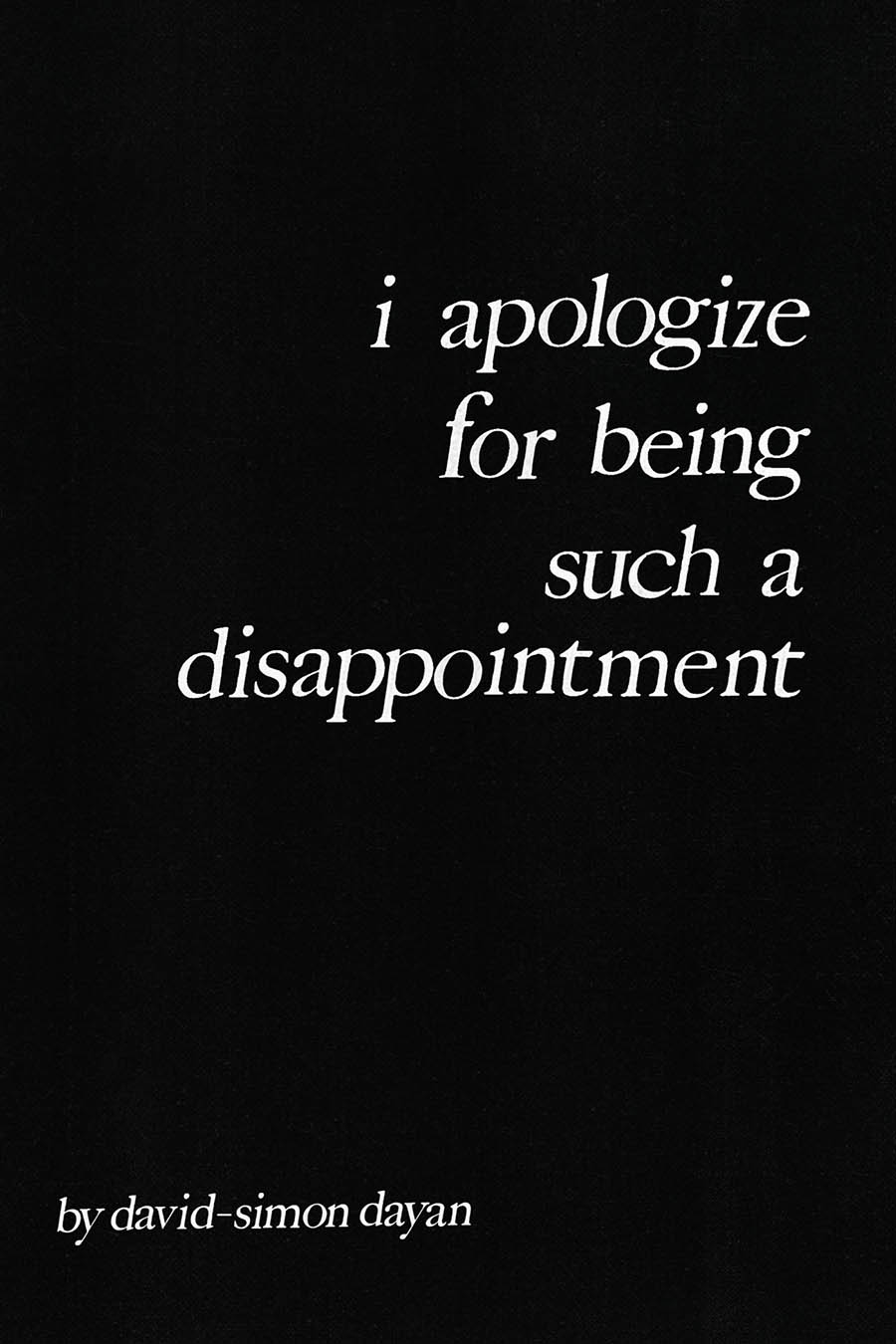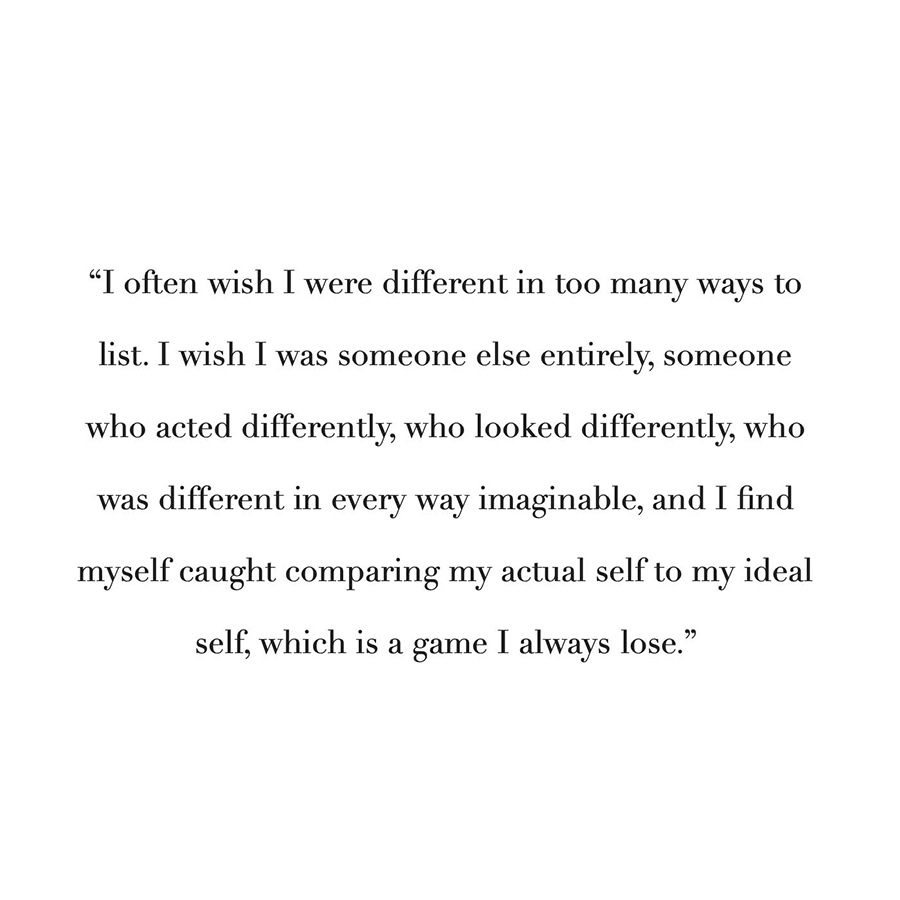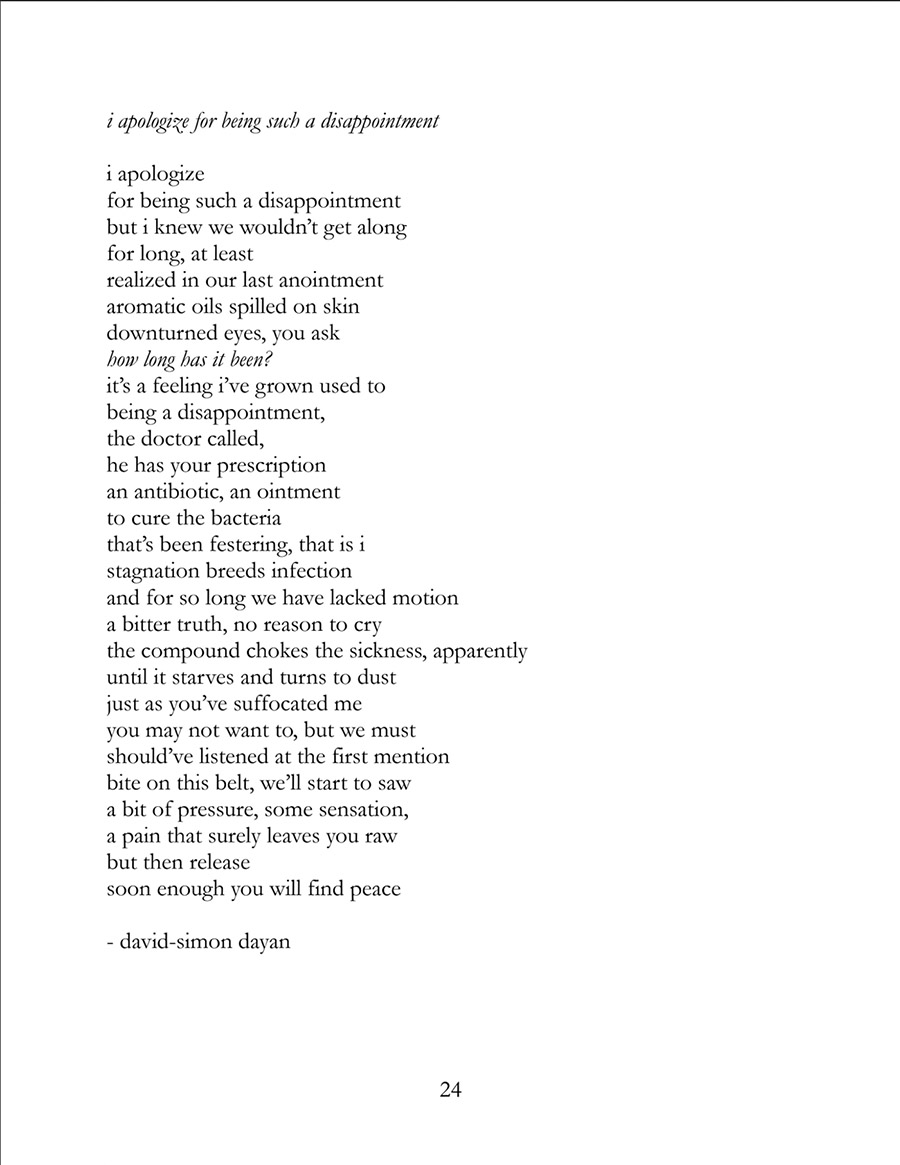

David-Simon Dayan is an artist based in Los Angeles. His work has been published in several publications as well as exhibited in The Museum of Fine Arts Boston, The Little Black Gallery, The Brooklyn Film Festival, and New York City Independent Film Festival.
His visual and written work captures an intimate and poetic look into an avant-garde world with a distinctive visual style and tangible feeling of warmth with his subjects. CAP 74024 has the honor to invite actor Ben Aldridge, a close friend of David-Simon Dayan, for an intimate talk with him on his poetry composition, his inspiration, creativity and sentiment.


What spurred you to write your first poem? Is it something you’d still stand by? Is it in this chap book?
“i’ve written you every day,” which is the first poem in this collection, came about after spending time with someone I really felt connected to. Someone I thought I had, or rather did have feelings for and am now discounting because they were unrequited. And I wanted to tell him, but was too nervous to, and I kept writing these messages and deleting them. And this was the start of my love for writing poetry as an adult. But I recently discovered an old notebook of mine in a dusty box that’s been in storage recently, which mostly consisted of doodles, but then found a few poems. Mostly half-baked, but there’s one I now remember so clearly writing. It contained a line about craving the taste of someone’s cigarette on their lips, and I was probably sixteen when I wrote it, and though it may sound a bit precocious, I stand by it wholeheartedly.
That doesn’t sound precocious at all. That sounds exactly like the musings of a curious sixteen year old and good grounds for a poem. Could you share your process of writing a poem? Do you feel altered by the act of writing poetry?
When I write poetry, it’s always on my phone. I’ll have a consuming feeling that I can’t shake, and it’s a bit like a string. Or a frayed stitch that I have to find the end of and pull. Because it’s exposing a thought burrowed deep in my mind, and it’s getting tangled in there so I have to grab hold and yank it out. And it often feels fleeting, if I don’t pull over and begin to write that thought it’ll burrow further and I’ll lose it. And writing the stream of thought doesn’t necessarily mean I’m free of it, rather I can look at it, I can hold it and read it and hear it speak its existence and try to find some gratitude for it by harnessing its power, one that, moments earlier, was exclusively being used for self-destruction.
These poems are highly personal, at times almost shockingly intimate. Is this work purely autobiographical?
I think I try to bottle intimacy up through my work, though that makes it sound more conscious than it is. The act of reliving intimate moments often dictates what I write—it’s cathartic really. Though I’ve written some that aren’t explicitly autobiographical, each of these are. Autobiography comes most naturally.
You predominantly work as a visual artist; a photographer, do you think and write visually too? For example so much of this work feels like it draws on very real experiences, are you transported to those moments visually whilst writing?
Photography in its execution feels far from writing in certain ways, but when I write, I always have visuals playing in my head. Whether a memory or imagined scenes with another person. When taking a photograph, whether documentary or produced, I always experience a sort of premonition of the composition, even if it’s only a split second before capturing it, and the act is an exercise in achieving the image, bringing it to life. But both are vehicles to a moment. Which might include the feeling of sand under your feet, or the view of a cold, dark room, or the back of someone’s head as you drift asleep. Isn’t all art a vehicle in that way?
Making sense of a moment? Yes it is. You manage to hold both the sensory and the cerebral in these poems, is it hard to strike that balance?
Thank you. And thank you for asking because I didn’t want to go on too much a moment ago, but yes. The sensation feels extremely loud. And it’s usually somewhere in my back, like being stuck in an uncomfortable chair. I struggle to pinpoint these sensations though. My feelings seem to coat my thoughts with no way to separate the two.


There seems a real push and pull between the reality of how you think and feel and how you ‘should’ think and feel, or how you’d ‘like’ to, almost as though you’re painfully aware of the alternatives and always wrestling with them? Can you speak to that?
Absolutely. I’m constantly judging myself. Holding myself to a different standard than I can achieve. I consider potential often. And failed potential. We’ve all experienced the pressures of performing in a way that satisfies others, family often. Who we are differing from who we should be, who we ought to be. And we internalize these ideas. And we form our own ideas, independently. I often wish I were different in too many ways to list. I wish I was someone else entirely, someone who acted differently, who looked differently, who was different in every way imaginable, and I find myself caught comparing my actual self to my ideal self, which is a game I always lose.
The title of this chapbook, and the last poem in it, is heart crushing. Tell me what disappointment means to you.
Disappointment is everywhere. It’s a possible outcome of every interaction. I have ideas of how I hope things might go, of what I may have the opportunity to experience, and often those hopes are met with disappointment. In this poem, I was referring to a time when I thought I shared an idea of how a relationship would go, but then realized it wasn’t possible. And even though he wanted it, and I thought I did too, I couldn’t fulfill my duties in that role. And I knew he was disappointed in me, that I was a disappointment, and I agreed. Which speaks to your earlier question about the disparity between what I am and what I should be.
These poems seem brutally honest, some may say self punishing. How does it feel to be exposing these parts of yourself?
It’d feel a lot better if someone else would punish me. And it does feel exposing. It definitely did when I first started sharing my poetry, because I felt so open to criticism. So ashamed of these thoughts I was now publicizing in some way. But I’d say now it feels freeing. And the messages I’ve gotten from friends and complete strangers are so meaningful they’ve often moved me to tears. And I’m not lost to the beauty in the power of writing. Poetry is a shortcut to understanding another person, a shortcut to empathy and connection. For thoughts and feelings that feel so shameful, the expression of them has this profound ability to paint them a color I didn’t expect, shaping them into a robust tool.
‘Lost in the Sea’ moved me to tears. In it, you write “the day fades/as does my smile,/allocated to memory, a presence no longer,/of paths crossed,/key to door,/hand to lamp,/open,/click,/a room appears,/one i know well, /staring blankly back at me with no appease/a wave/then quick, a thought, snap out,/as many say, you are your only/so get to know him,/love him,/care for him,/but being alone is remarkably lonely” I felt as though I’d lived it. Tell us about what inspired you to write it.
“lost in the sea” is about letting the worries of reality go, experiencing joy free of the burdens that feel ever-present. How it feels light and freeing, but it’s fleeting, because even though you danced under the heat of the summer sun, and you kissed the skin of a person you met that day, and it might free you momentarily, you’ll still end up in your bedroom, alone, after the day’s dissipated, and you’ll find yourself staring at your wall wishing you could feel the way you felt about them toward yourself.
Ugh, yes. Amen. Despite the evident pain, these poems are also filled with love, almost romance. Would you agree?
I wouldn’t say they’re love poems *laughs*. But to some extent, they are. What can I say? I’m a romantic. But sometimes romance isn’t easy. Expectations aren’t fulfilled. Timing isn’t right, or the characters fall short, but I do hope for romance.
Yes they feel very tethered to love, craving it, losing it, feeling it, cultivating it for yourself, or sometimes the evident lack of self love, that wrestle, love seems to drive them for me, as a reader. You began sharing your poetry on social media. How did it feel to make that first post?
I appreciate you saying that. I felt wildly nervous sharing my poetry for the first time. I felt like a fraud, which isn’t new, but poetry carries so much vulnerability. It’s a one way ticket to the inner workings of my heart and mind. And most of these poems are about feeling lesser than in some way or another. Feeling like an imposter or a loser. But I was pleasantly surprised at the way people reacted. It was unlike any reactions I’ve gotten to photography. I believe because it felt so much more personal, so much more human.

Poems from I Apologize for Being Such a Disappointment




Poetry of David-Simon Dayan
Interview by Ben Aldridge